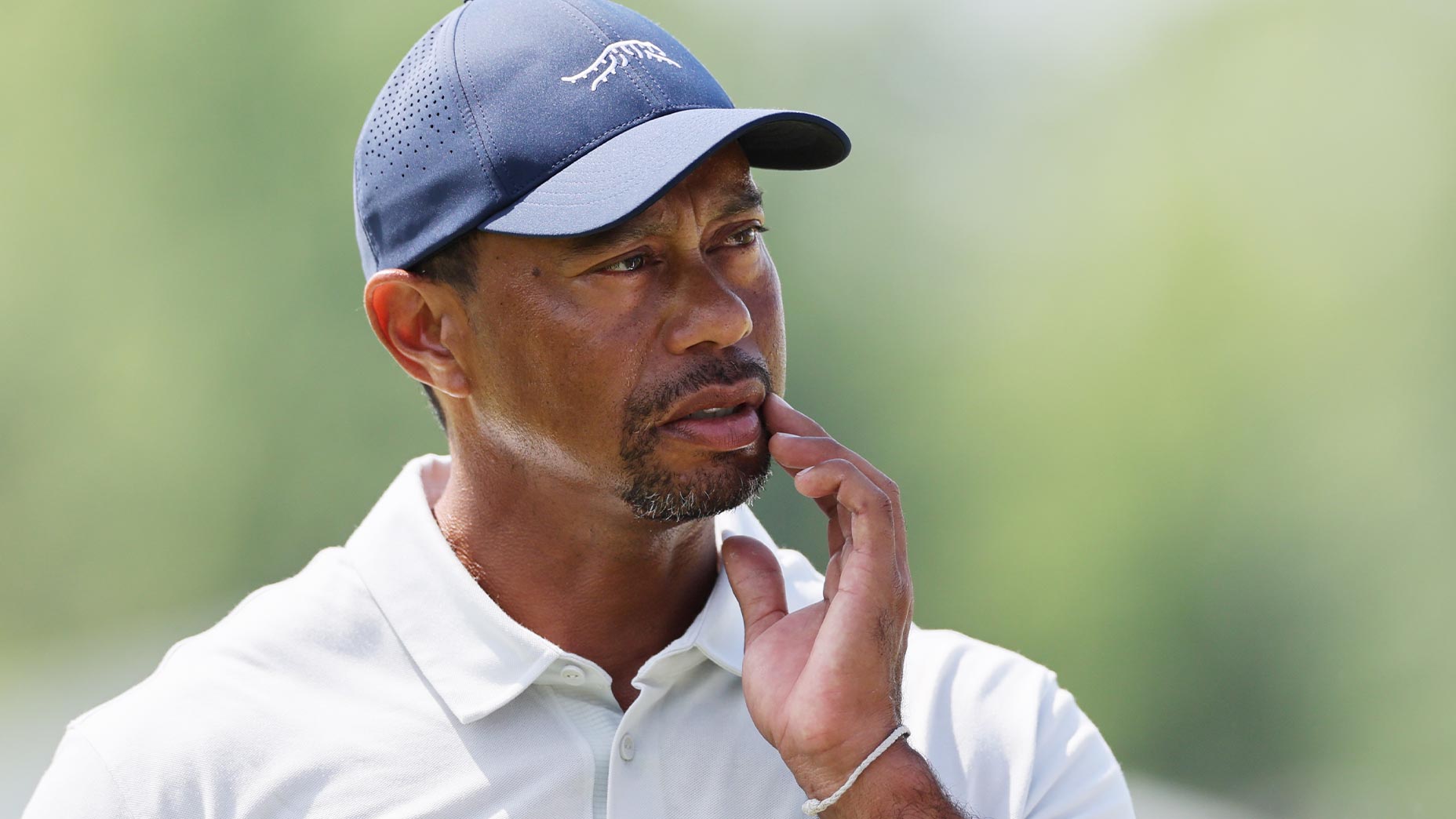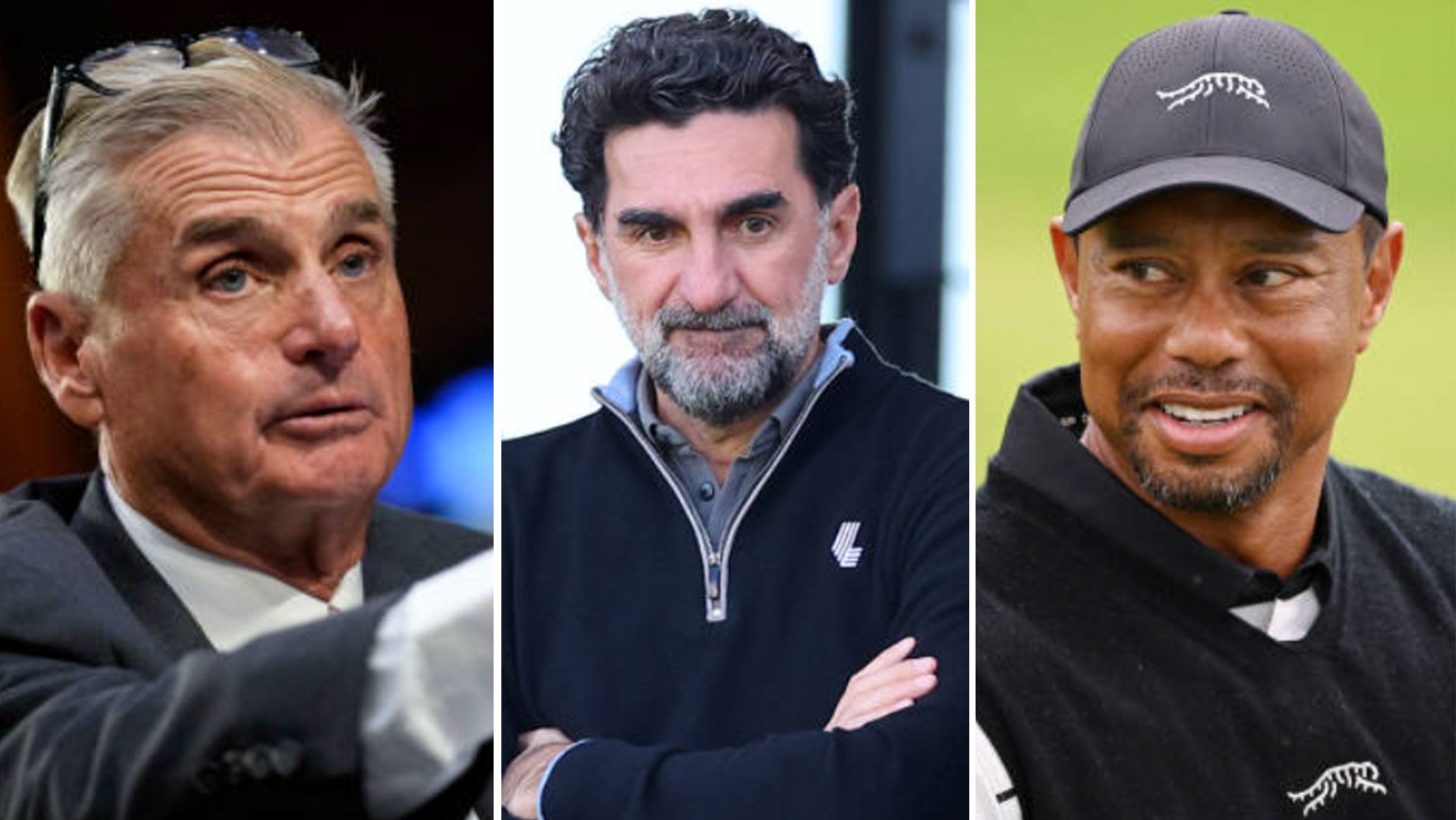There’s a big debate over being steep vs. shallow in the short game. What’s best for the average player? I tried to find out. The post As an average player, is steep or shallow better? I did a deep-dive to find out appeared first on Golf. There’s a big debate over being steep vs. shallow…
Tiger Woods ducked a question. But his answer was still revealing
Tiger Woods wasn’t especially forthcoming when discussing PGA Tour-PIF relations at the PGA Championship Tuesday. But one answer stood out.
The post Tiger Woods ducked a question. But his answer was still revealing appeared first on Golf.
Tiger Woods wasn’t especially forthcoming when discussing PGA Tour-PIF relations at the PGA Championship Tuesday. But one answer stood out.
The post Tiger Woods ducked a question. But his answer was still revealing appeared first on Golf.
Don’t believe what you’ve read or heard: Tiger Woods can deliver in press conferences. When he fields a question upon which he’s happy to opine or reflect — often those queries relate to the X’s and O’s of game management — he can provide as textured an answer as any of his peers. At the PGA Championship on Tuesday, we saw and heard a glimpse of that when Woods was asked to assess the games of Scottie Scheffler and Rory McIlroy. After referencing Scheffler’s unconventional footwork and McIlroy’s perfectly balanced finish (“It looks like a statue, right?”), Woods offered this insight:
“When you’re on the range and watching them hit golf balls or listening, more so listening to them hit golf balls, there’s a different sound to it, because they just don’t miss the middle of the face.”
Fabulous stuff.
If only Woods was always so generous with his thoughts, particularly when it comes to the tenuous state of men’s professional golf. The craziness reached another level of crazy Monday when man-about-golf Jimmy Dunne, who helped broker the PGA Tour’s 2023 framework agreement with the Saudi Arabian Public Investment Fund, announced he had resigned from his post as an independent director on the Tour’s Policy Board, in part because the board has made “no meaningful progress” toward a deal with the PIF. Dunne added that he was feeling, in his role, “utterly superfluous.”
Superfluous — “exceeding what is sufficient or necessary,” according to Merriam Webster — is not, and never will be, an adjective that you would apply to Tiger Woods. Conversely, Woods is needed, essential, longed for. When he plays, the world watches. When he limps, the world winces. When he speaks, the world leans in and listens. Not just his fans but also his peers, Tour and PIF brass and just about anybody else with a stake in the game. Which is why last summer 41 of Woods’ fellow players — Scheffler and McIlroy among them — banded together and demanded that the Tour create a board spot for Woods. The men’s pro game was reeling, the players were still seething from Dunne’s secretive dealings with the Saudis and, in the players’ eyes, the Tour’s governance needed a shakeup. It needed, among other things, a dose of Tiger Woods.
And so it was. Woods, who had never previously held a board seat or shown much interest, at least not publicly, in muddying his hands with Tour management, was in. The move was significant not only because Woods was assuming a position of influence but also because his appointment meant that the players on the board — Woods joined McIlroy, Patrick Cantlay, Charley Hoffman, Peter Malnati and Webb Simpson — now outnumbered the five non-player members. The pros had seized majority control. In a statement, Woods said, “…the players will do their best to make certain that any changes that are made in Tour operations are in the best interest of all Tour stakeholders, including fans, sponsors and players.”
One of the first times Woods was publicly asked about his new role came in February, at the Genesis Invitational. What, Woods was asked, would he say to fans who have grown disenchanted by the endless talk of money in men’s pro golf? It’s a common question in press rooms these days. Woods spoke of the importance of having “the best players play,” and also of the value of history, tradition and “pathways” to the Tour. He also referenced the Strategic Sports Group, which just a couple of weeks earlier had agreed to invest up to $3 billion into the Tour’s new for-profit arm, PGA Tour Enterprises. The consortium, Woods said, will “provide us with information and help and trying to create the best tour we could possibly have.”
If you were one of those disenchanted fans, perhaps you were hopeful to hear more from Woods.
A couple of months later, at the Masters, Woods was asked about the first in-person meeting he and his fellow board members had had in March with the PIF’s chief, Yasir Al-Rumayyan. “I don’t know if we’re closer, but certainly we’re headed in the right direction,” Woods said. “That was a very positive meeting, and I think both sides came away from the meeting feeling positive.”
Again, perhaps you were hopeful to hear more.
On Tuesday, more questions for Woods, whose Tour C.V. seemingly has been growing by the month. Flip past the beefy “Accomplishments” section (82 Tour wins, yadda yadda) to “Work Experience” and you’ll find:
-Member, PGA Tour Policy Board, 2023-present
-Vice Chairman, PGA Tour Enterprises Board, 2024-present
-Member, PGA Tour Enterprises’ Transaction Subcommittee, 2024-present
Woods suddenly has a hand in everything. He assumed the third of those roles earlier this month, and it’s a critical one when it comes to shaping pro golf’s future, because the members of that seven-person committee — which includes two other players, Rory McIlroy and Adam Scott — have been bestowed with exclusively handling all direct negotiations with the PIF. They’re the new Jimmy Dunnes.
Still, despite Woods’ growing responsibilities, there’s at least one duty that he still appears unwilling to take on: communicating the status of Tour-PIF relations to the outside world. On Tuesday, he was asked several questions on the matter. About the state of the negotiations (“ongoing; it’s fluid; it changes day-to-day”); about provisions he’d like to see as part of a deal (“…we’re making steps. That’s all I can say”); about Dunne’s characterization of his role being “superfluous” (“his role and his help…has been great”).
Not exactly a font of insight. Look, we get it. There are questions that Woods can’t directly answer. The negotiations are layered and complex and fraught — even the smallest leaks or broadcast of misinformation could be costly. But Woods, with his new titles and access to information, can and should do better. He needn’t give us everything, but surely he owes us something. A nugget here, a meaningful update there. An opinion. A peek or two behind the curtain.
Look at his peers. Rory McIlroy’s candor and thoughtfulness is well documented, but there are others. Max Homa, when asked Tuesday about fans being turned off by all the politicking, gave a nearly 400-word response that included this observation: “I don’t like where it’s going. It’s got to be exhausting to be a casual golf fan at this point in time. I don’t know why you would want to hear about the business side of this game.” Jordan Spieth was colorful, too. When asked about the players seemingly wresting back more control, he said, “If you’re in the room, it’s very obvious that players are not dictating the future of golf and the PGA Tour. Like, it needs to be, you need to have everyone’s perspective on both sides of it, and everyone that’s involved within Enterprises. You have a lot of strategic investors that know a heck of a lot more than any of us players.”
Ironically, the most revealing part of Woods’ Tuesday press conference came by way of one of his tersest answers. After Woods had skirted a reporter’s question about whether he’s personally open to the Tour negotiating a path forward with Saudi investment, the reporter doubled down and asked again, “Are you personally open to it?”
“I’m personally involved in the process,” Woods said.
That cryptic non-response is open to interpretation. My interpretation: No, Woods is not, in fact, wild about cutting a deal with the PIF but he’s not about to up and leave the table, either. It is what it is, as he likes to say. Woods is a hardened Tour loyalist, as you would be, too, if your name was etched on dozens of Tour trophies and all over its record books. A fractured game and multiple competitive outlets for the world’s best players is of no benefit to Woods or his legacy. In his mind, the Tour is the tour, the mountaintop, the measuring stick. Always has been and always should be.
The final question Woods faced Tuesday was a familiar one, on fans’ souring relationship with the men’s game. Woods acknowledged that fans likely have tired of all the scheming and squabbling, adding, “It’s about what LIV is doing, what we’re doing, players coming back, players leaving — the fans just want to see us play together. How do we get there is to be determined.”
Woods will be at the center of those decisions. Just don’t bank on him letting the rest of us in.
The post Tiger Woods ducked a question. But his answer was still revealing appeared first on Golf.


